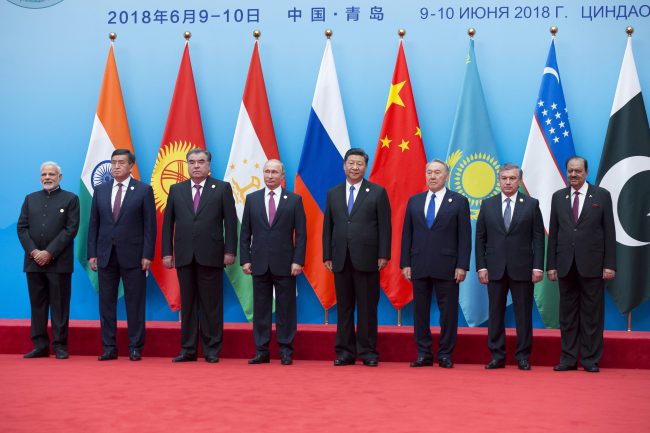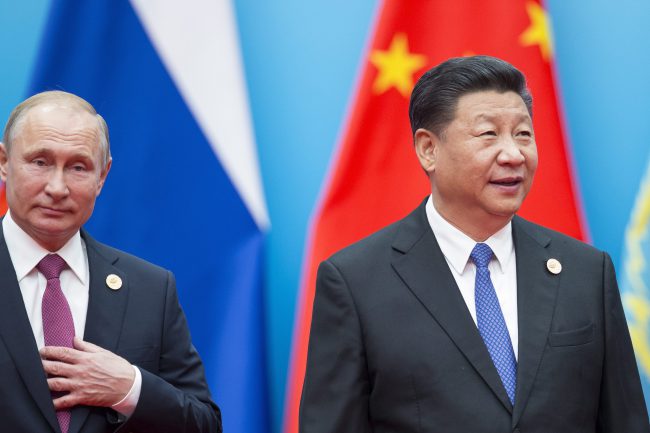QINGDAO, China – Chinese President Xi Jinping hailed the entry of India and Pakistan into a Chinese-led bloc at a closely orchestrated gathering Sunday that stood in stark contrast to the G-7 summit that ended in disarray.

Xi welcomed Indian Prime Minister Narendra Modi and Pakistani President Mamnoon Hussain, calling their presence “of great historic significance” in opening remarks at this weekend’s summit of the Shanghai Cooperation Organization in the northern Chinese port of Qingdao. The two South Asian nations joined the bloc as full members last year.
“More member states means greater strength of the organization as well as greater attention and expectations of people of regional countries and the international community,” Xi said Sunday.
“We also share greater responsibilities in maintaining regional security and stability and promoting development and prosperity,” he said.

The Beijing-led bloc, which experts see as seeking to challenge the Western-led order, is dominated by China and Russia and also includes Kazakhstan, Uzbekistan, Kyrgyzstan, and Tajikistan. Founded in 2001, it was originally conceived as a vehicle for resolving border issues, fighting terrorism, and – more implicitly – to counter American influence in Central Asia following its invasion of Afghanistan.

Get breaking National news
In recent years, its economic component has grown more prominent, embodied in Xi’s signature, trillion-dollar foreign policy and infrastructure drive known as the Belt and Road Initiative.
Beijing’s infrastructure projects in Central Asia make some in the bloc uncomfortable – particularly India, which alone among members has refused to endorse the program. Russia, too, is wary of China’s expanding influence, and though it has somewhat reluctantly embraced the Belt and Road, it is also seeking to expand its own economic and political leverage in the region through a customs union it dominates known as the Eurasian Economic Union.
READ MORE: Trump lashes out at Trudeau after PM contradicts him in public
China has sought to downplay concerns that the Shanghai grouping is a way for Beijing to project its strategic influence abroad. The Global Times, a Communist Party newspaper, said Sunday in a commentary that unlike Western organizations like NATO and the G-7, which seek to “consolidate the global economic order that is favourable to the Western world,” the Shanghai Cooperation Organization is inclusive.
It is “is not a tool for geopolitical games, seeking hegemony or engaging in international confrontation,” the paper said.
Still, as trade tensions simmer between China and the U.S., in recent months Beijing has been drawing closer to Moscow and New Delhi. On Friday, Xi presented Russian President Vladimir Putin China’s first Friendship Medal at an elaborate ceremony in Beijing.
READ MORE: More American diplomats in China hit with mystery health issues, U.S. says
On Saturday, Xi met Modi for the second time in two months, signing deals on the export of non-basmati rice and sharing information on the waters of the Brahmaputra River, which runs between China and India, according to tweets by spokesperson of the Indian Ministry of External Affairs Raveesh Kumar.
Security was tight and discussions largely took place behind closed doors, with plainclothes officers ushering pedestrians away from diplomatic motorcades.
Xi’s meticulously-choreographed appearance was a striking contrast to the tumultuous Group of Seven summit of leading industrialized nations that concluded Saturday in Quebec and saw the U.S. and its allies divided by escalating trade tensions.
President Donald Trump lashed out at Canadian Prime Minister Justin Trudeau in an extraordinary set of tweets from Air Force One, calling him “dishonest & weak” and retracting the U.S. endorsement of the G-7 summit’s communique over trade tariffs.
Trump earlier caused a stir by suggesting the G-7 offer a seat at the table to Russia, which was ousted from the group in 2014 as punishment for Putin’s annexation of Crimea and support for pro-Russian separatists in Ukraine. He skipped sessions on climate change, clean energy and ocean protection and departed early for Singapore for Tuesday’s summit with North Korean leader Kim Jong Un.







Comments
Want to discuss? Please read our Commenting Policy first.